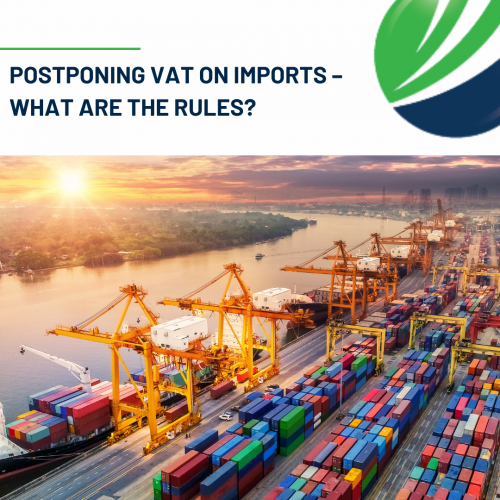Postponing VAT on imports – what are the rules?

posted 29th January 2022
Since January 2021, UK importers have been able to make use of the ‘postponed VAT accounting’ scheme. But what is postponed VAT?
Since 1 January 2021, it’s been possible for UK importers to make use of the ‘postponed VAT accounting’ scheme. This scheme allows your import business to account for VAT due on imports on your VAT return, rather than paying the cost of the VAT at the point of importation.
But why is this postponed VAT system needed? And what’s the key advantage of postponing your VAT in this way?
Why is postponed VAT needed?
The import and export rules have changed quite radically since the UK left the European Union on 1 January 2021. Prior to Brexit, VAT-registered businesses in Great Britain applied VAT through a system known as the EU reverse charge. This reverse charge simplified the taxation of intra-community transactions for both suppliers and buyers.
But since Brexit, the import VAT system has changed
- With the UK now no longer part of the EU, the EU reverse charge system can no longer be used by UK businesses.
- Imports from EU member states are now treated in exactly the same way as all other international imports.
- Any imported goods over £135 are now subject to VAT on the value of the goods.
- The postponed VAT agreement helps UK importers push back the time at which they account for this VAT – adding it to their return rather than paying it at the point of importing the goods.
How does postponed VAT help my cashflow?
Having to pay VAT at the point of importation will obviously have a significant cashflow impact for many UK businesses. The postponed VAT accounting scheme was introduced to reduce the immediate VAT hit on a company’s cashflow.
- Instead of being liable to pay the VAT on goods at the point of importation, and then claiming this back on the VAT return, companies can opt to account for the VAT through their VAT return at a later date.
- This reduces the initial import costs, boosting cashflow and allowing your business to report its input and output VAT in one go through the VAT return.
How do I account for postponed VAT?
The Government has provided guidance on how to fill out your VAT return for postponed VAT. You’ll need to obtain a C79 form and then use the information on it to complete your VAT return for the VAT period when you imported the relevant goods.
To do this, you must fill out the appropriate boxes on the form:
- Box 1 – Include the VAT due in this period on imports accounted for through postponed VAT accounting. You’ll be able to get this information from your online monthly statement, or you must estimate the amount if you’ve delayed your customs declaration and don’t have a statement.
- Box 4 – Include the VAT reclaimed in this period on imports accounted for through postponed VAT accounting. You must estimate the amount if you have delayed your customs declaration and don’t have a statement.
- Box 7 – Include the total value of all imports of goods in this period, not including any VAT.
With this information, HMRC can review both the input and output VAT for the period in question, and then advise you of:
- Any VAT that’s due to the business
- Any VAT payments that you’ll need to make to HMRC.
Talk to us about switching to postponed VAT
If you’re a UK-based import business and haven’t yet moved to the postponed VAT system, now is the time to make the switch and improve your cashflow position.
As your accountant, we can advise you on the best way to account for your import VAT and can demonstrate the cashflow benefits of moving to the postponed VAT system. VAT is a complex area and it’s always advisable to talk to a VAT tax expert when amending your VAT process.
Get in touch to discuss your import VAT.


